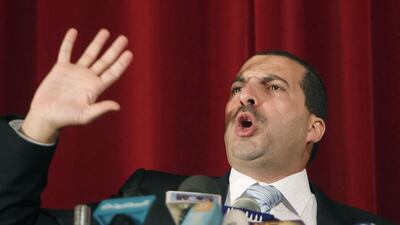Muslim scholars continue to talk about the rise of extremist and corrupt ideas that hijacked the faith. They say that this led to the formation of ISIL and other terrorist groups that claim to represent the religion.
Last week, Dr Usama Sayyid Al Azhari called it a "dark philosophy with a grim vision that's using inaccurate Quranic translations to alienate and expiate everyone from the tolerant teachings of Islam".
He is not alone in this view. The majority of scholars criticise extremists and rightly note that they are a minority who have diverged from the teachings of Islam. But how many actually provide feasible solutions?
Egyptian activist and television preacher Amr Khaled, who was chosen as one of the world’s 100 most influential people by Time magazine in 2007, has started an extensive debate on this issue in his Ramadan TV programme Al Iman wal Asr (Faith and Modern Age). He tackles the roots of the problem and suggests a few strategies to reconstruct the religious monologue.
Dr Khaled begins his programme by talking about the Quran, which some in the non-Muslim world view as the primary cause of the terrorism that we now see.
He says that there are four challenges facing Muslims today when it comes to understanding the true enlightenment of the Quran. First, the young lack an understanding of the Arabic language and the objectives of the Quran. Second, the human dimension of the holy book has been widely ignored.
Third, the weakened role the Quran plays in the life of the average Muslim. Fourth, the misconception created by taking verses from the Quran out of context, which leads to extremism and atheism.
Looking back in time, Dr Khaled explains that Muslims in every period have introduced creative ways to understand the holy book. In the early days of Islam, words were written without diacritical dots because Arabs were eloquent and could easily differentiate between letters. When Ali ibn Abi Talib became caliph, he introduced diacritical dots to allow more people to read and understand the Quran even as more people converted to it.
The second major initiative was by Abu Al Aswad Al Du’ali, one of the first Arab linguists of the Islamic Golden Age. He introduced consonant-pointing and vowel-pointing (markings) on Arabic letters in the Quran to identify them clearly.
The third initiative was the introduction of the science of tafsir or exegesis, the critical explanation of the Quranic text to provide perspective on time and place.
The fourth initiative was the science of tajwid or elocution, to explain the rules governing pronunciation while reciting the Quran.
Finally, the translation of the holy book to other languages.
In every generation, Dr Khald explains, there were people who looked for creative ways to fill gaps between Muslims and their religion, making the language of the Quran easy, understandable and clear to young people.
However, the spirit of initiative disappeared about 70 years ago and “intellectual stagnation” resulted. There was total compliance with tradition and a fear of creativity, which led to ignorance and the emergence of corrupt ideas and concepts that reinforced extremism and atheism in the Muslim world.
The clannish and pedantic approach of many members of the religious elite has negatively affected the image of Islam even among Muslims. Instead of confronting pressing contemporary issues and addressing the concerns of young people, many of them remain focused on trivial details.
Dr Khaled compares this state of “intellectual stagnation” with the fast-paced world in which we live. Nowadays, online content is short and simple and the young have neither the time nor the ability to read tafsir books, which have many chapters. Doing so has become a restricted activity, pursued only by specialised people.
So how can Muslims address the challenges of the modern age? Dr Khaled says that tajdeed, or renewal, is needed to close the gap between religion and life; to renew our understanding of religion without changing its fundamentals. He also puts great focus on engaging young people in the process and using language they understand.
It’s easy for ISIL to craft their violent messages and disseminate them online and on social media networks – they lack sophistication and depth and revolve around the idea of “us” and “them”. However, when it comes to the nuanced meanings of the Quran, the process becomes tricky.
Dr Khaled provides a solution: if 140 characters are not enough to explain, they can be used to share infographics, interactive and other sophisticated material that carries a nuanced message in a simple and visually appealing way.
We need to be creative like the generations before us.
aalmazrouei@thenational.ae
On Twitter: @AyeshaAlmazroui

